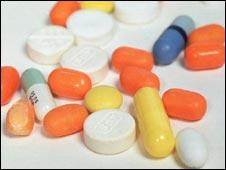Campaigners want quick access to ВЈ200m cancer fund
- Published

NICE said Nexavar's benefits did not justify its high cost
Patients have asked for quicker access to the ВЈ200m cancer drug fund after the NHS refused to pay for a new liver cancer treatment.
The fund is to be set up next year by the government to give patients access to treatments the NHS cannot afford.
But the Pamela Northcott Fund wants it set up sooner after the drugs watchdog blocked the use of Nexavar.
The National Institute for Health and Clinical Excellence said the treatment was too expensive.
It extends life by less than three months on average, costing ВЈ27,000 a patient.
NICE indicated last year it was unwilling to give the health service the green light to fund the drug - and this week it rejected an appeal by the manufacturer Bayer.
Kate Spall, who founded the Pamela Northcott Fund after her mother's death in 2007, which suppots patients who are struggling to get access to drug treatment, said: "While the policy pledge is due in April 2011, today we are asking the government to bring this date forward.
"We are not talking about a lot of patients - there are only about 400 who need this drug - so I don't see why it can't be done as soon as possible."
The Pamela Northcott Fund received 10% of its funding from Bayer last year, although Ms Spall said the company did not have any say over her work.
The cancer fund was one of the Conservative's high-profile promises during the election campaign.
It is to be funded from savings made by blocking Labour's plan to raise national insurance contributions for employers.
However, exact details of how it will work have not been released and the government suggested it was not in a position to start handing out money yet.
A Department of Health spokesman said behind the scenes talks were still taking place.
He added: "We will be releasing more details about the policy and funding behind the new cancer drug fund soon."
Andrew Dillon, chief executive of NICE, said: "The drug does not provide enough benefit to patients to justify its high cost."